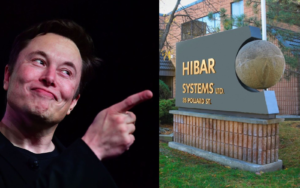Ontario-based company brings specialist battery manufacturing expertise to global EV giant amid talk of “Tesla’s secret battery lab”

Photos: Frederic J. Brown/AFP/Getty Images and Hibar Systems Limited.
Ontario-based company brings specialist battery manufacturing expertise to global EV giant amid talk of “Tesla’s secret battery lab”
Tesla Inc. is expanding into Canada with the purchase of a Richmond Hill, Ont., company specializing in battery manufacturing, Hibar Systems Ltd.
The quiet purchase — not previously reported — happened between July and October of this year, public records show.
The acquisition comes at a pivotal time for Tesla, as the Palo Alto, Calif.-based electric carmaker is known to be ramping up its own battery manufacturing efforts. That work has another Canadian connection — a five-year research agreement with Jeff Dahn, a Dalhousie University physicist and global research leader in lithium-ion batteries.
Tesla has not yet responded to a request from Electric Autonomy Canada for comment on the deal. Iain McColl, the president and CEO of Hibar Systems, referred this reporter to Tesla when contacted.
Lobbyist registration
Federal lobby registration documents, available on the government’s lobbyist registry database, show that in July 2019, Tesla Motors Canada ULC listed no subsidiary companies in its filing to lobby the government on various issues surrounding electric vehicles and infrastructure.
On October 2, 2019 a new filing was made that lists Hibar as a subsidiary with direct interest in the outcome of Tesla’s undertakings with the government of Canada.
Sometime after Sept. 16, Hibar also took down its operating website and replaced it with a single information page. But on the former website, in a section outlining its battery manufacturing capabilities, the company said it is “truly unique in its capability to provide the world’s leading manufacturers with innovative advanced automation solutions that are engineered specifically to suit their production automation requirements.“
Hibar Systems was founded in the early 1970s by German-Canadian engineer Heinz Barall as a leader in precision-making of small cell batteries through a highly mechanized pump injection system.
Global renown
The company grew to global renown in the battery industry and has seen a 600 per cent increase in revenues since its inception, according to a 2018 Report on Business interview with CEO Iain McColl.
Despite its industry acclaim, Hibar is hardly a household name in Canada. It most recently drew headlines when it was one of three Greater Toronto Area companies to receive grant funding through the federal National Research Council of Canada Industrial Research Assistance Program in April 2019.
Hibar was awarded $2 million that the company said it would use towards developing a high-efficiency lithium-ion manufacturing system, specifically for mass electric energy storage.

In lobbyist registration documents filed with the government of Ontario in October, Tesla cites its first objective is to “provide input and make recommendations to the government and its agencies regarding policies, programs, regulations and decisions that impact the demand for and/or adoption of solar energy, battery energy storage and related infrastructure.“
Multiple fronts
Tesla has been active in Canada on multiple fronts. On the commercial side, it is a well-established car dealer and along with that it has been aggressively building out its national charging infrastructure, including early deployment of its V3 Supercharger. But Tesla has also looked north for technical expertise — most notably its research partnership with Dalhousie’s Jeff Dahn and his 25 person team.
Dahn’s work is believed to tie into Tesla’s broader, strategic effort to develop its own battery-making capability and capacity.
Tesla has relied on Panasonic to produce its batteries since 2014.
In April, Elon Musk, CEO of Tesla, announced the company was driving towards making a “million mile battery,“ possibly as early as next year. It was a claim initially scoffed at by other industry players. But last month, a group of battery researchers in Dahn’s lab published a paper describing Musk’s dream battery and how it was actually possible to make.
Along with that, Tesla this year purchased Maxwell Technologies Inc., a California battery technology company. In June, CNBC ran a story based on information from “five current and recent employees” that Tesla had set up a secret lab to make batteries.
Facilities in China
In addition to having facilities in North America, Hibar also holds major manufacturing facilities in Europe, South Korea, Japan, Malaysia and China. It’s the latter location where Hibar has sunk in its roots.
In 2003, the company, seeing the exploding Chinese market for battery technology and coupled with the behemoth manufacturing industry, created a subsidiary company, Hibar China, to manage Asian production from its two head office locations in the country.
According to a company brochure, the Chinese market accounted for over 50 per cent of Hibar’s business in 2014.
In January 2019 Tesla broke ground on its Gigafactory 3 in China.
There is speculation the first made-in-China Teslas will be rolling off the assembly line this month and predictions that, if they maintain their rate of growth, Tesla will be producing 1,000 to 2,000 Chinese-made vehicles per week by 2020.






